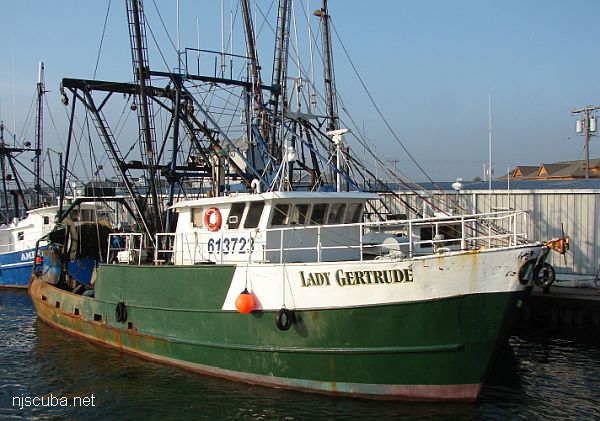Atlantic Princess

- Type:
- shipwreck, scallop dredge, USA
- Built:
- 1980, St. Augustine Trawlers, St. Augustine FL
as Eleanor Eileen X - Specs:
- ( 68 ft ) 121 gross tons, 6 crew
- Sunk:
- Sunday, December 14, 1980
foundered, 2 survivors - Depth:
- 170 ft
4 Missing at Sea as Boat Capsizes
The Daily Register
Monday, December 15, 1980
20 cents
BARNEGAT (AP) Four commercial fishermen were missing after their 90-foot scallop boat sank early yesterday about 43 miles from shore.
Two of the six-man crew on the Atlantic Princess were rescued from a life raft about 945 a.m. by another fishing trawler.
The boat capsized," said Petty Officer Clyde Pasterski of the Atlantic City Coast Guard "Apparently the dredge had caught on something, and when they tried to pull it up, the vessel capsized".
The dredge is a large steel piece of equipment pulled behind the vessel to collect shellfish by scooping dirt and sand from the ocean floor.
The two spent more than eight hours on a life raft in 8- to 12-foot waves and up to 25 mph winds. Pasterski said.
"From the reports," he said, "the accident happened so fast, the other four didn't have a chance to get on the life raft."
He said the fishermen's employer had asked the Coast Guard not to release names.
The Coast Guard searched for the missing men until sunset yesterday, but did not plan to resume the search at daybreak.
Coast Guard Presumes Men Lost Offshore
The Daily Register
Tuesday, December 16, 1980
20 cents
ATLANTIC CITY (AP) - U.S. Coast Guard officials say four commercial fishermen missing since their 90-foot scallop boat sank 43 miles from Barnegat Inlet apparently are lost at sea.
The Coast Guard was questioning two crewmen of the sunken Atlantic Princess who were rescued from a life raft about 9:45 a.m. Sunday, said Atlantic City Coast Guard spokesman Mark Behe.
Coast Guard officials said yesterday they have no immediate plans to resume a search for the four.
The two rescuees were identified as William Pritchard of Norfolk, Va, and Robert Duda of Newport News. Va. Their ages were not available.
The crewmen were rescued by another fishing trawler, Virginia Options, which arrived here early yesterday morning.
Pritchard was treated for swelling of one of his legs at an Atlantic City hospital and then released.
Petty Officer Clyde Pasterski of the Atlantic City Coast Guard said the boat appeared to have capsized. "Apparently the dredge had caught on something and when they tried to pull it up. the vessel capsized," he said.
Small craft advisories had been in effect Sunday morning, according to Behe.
Two Coast Guard vessels and a helicopter searched for 18 hours Sunday but found no clues leading to the whereabouts of the four missing crewmen
Editor's Note:
The builder seems to think the length is 68 feet. The articles are in error.
This boat was less than a year old when it was lost; there do not seem to be any photos of it. The Lady Gertrude pictured above was about the same size from the same builder, and was probably similar.
622600, IMO: 8036471

Questions or Inquiries?
Just want to say Hello? Sign the .